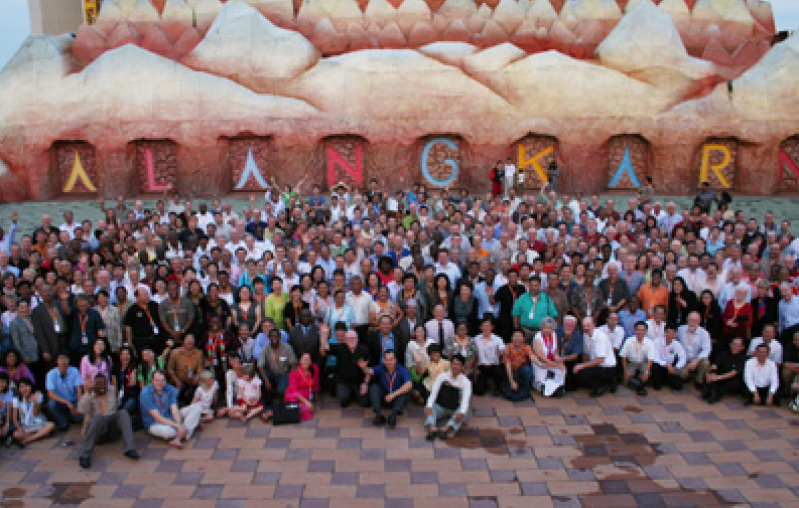
PATTAYA, Thailand – After five days of intensive meetings and vision setting at the World Evangelical Alliance’s first general assembly in six years, over 500 evangelical leaders did more than just renew their commitment to taking the Gospel to the ends of the earth.
Participants of the WEA General Assembly in Pattaya, Thailand, also passed six major resolutions, expressing the concerns of 128 national Evangelical Alliance leaders on issues related to religious liberty, peace-making, the global financial crisis, HIV and AIDS, poverty, and creation care.
“We commit ourselves to listen with understanding to our children, youth, women, and the most marginalized – especially people living HIV – so that we can work together for a healthy and safe future which will enable all people to live in the abundant life Jesus promised,” expressed one resolution calling evangelicals to action in the fight against HIV/AIDS.
“With brokenness we admit that as Evangelical Christians we have allowed stigmatization and discrimination to characterize our relationships with people living with HIV,” it continued, acknowledging that the “Body of Christ, His Church, is living with HIV.”
“We repent of these sinful attitudes and commit to ensuring that they are changed.”
During this year’s WEA general assembly, which concluded Thursday, participants helped to form a new shared vision for WEA and a five-year roadmap to achieve the vision. They also received practical training to help national alliances become more effective, networked with one another to build a stronger Christian body, and were informed about some of the most pressing global issues and the Evangelical responses to them.
Among the issues discussed was the financial crisis, which the WEA said had revealed how quickly and effectively governments and international institutions can move to mobilize massive resources in the face of serious threats to our global, common economic well being.
“Yet one child dying of preventable causes every three seconds and 2.7 billion people barely sustained on an income of less than two dollars per day has yet to evoke a similar level of urgent response,” stated the preamble to the WEA resolution on the United Nations’ Millennium Development Goals.
“We believe this to be an affront to God, a shame to governments and civil society, and a massive challenge to the witness and mission of the followers of Christ.”
The MDG resolution urged governments to “do whatever is necessary to achieve the MDGs and to see the on-going crisis of global poverty as the paramount threat to peace and our common well being.”
It also commits WEA members to the Micah Challenge, a global Christian campaign that works to deepen Christian engagement with impoverished and marginalized communities, and to challenge international leaders and leaders of rich and poor countries to achieve the MDGS by 2015.
The WEA also passed a resolution on the “Care of Creation,” which rebukes man’s role in the degradation of God’s creation and stresses a Bible-based response to the solution of today’s ecological problems.
“We recognize that our children face a growing crisis in the health of the creation in which we are embedded and through which, by God’s grace, we are sustained. Yet we continue to degrade that creation,” the resolution stated.
“Because we have sinned, we have failed in our stewardship of creation. Therefore we repent of the way we have polluted, distorted, or destroyed so much of the Creator’s work,” it added.
Aware that some have been critical of WEA’s increasing engagement in social issues traditionally the focus of more liberal Christian groups, Dr. Geoff Tunnicliffe, the international director of the WEA, insisted that such engagement would not compromise the WEA’s commitment to bringing people to Christ.
“If anyone tells you that we’ve gone soft on world evangelization you can tell them that we are totally committed to world evangelization because it is only Jesus Christ that changes people’s lives,” he said in an address Wednesday.
The evangelical leader said the WEA’s forward strategy would be undergirded by an understanding of integral mission or “holistic transformation – a proclamation and demonstration of the Gospel."
“It is not simply that evangelism and social involvement are done alongside of each other but rather in integral mission proclamation has social consequences,” he said. “We call people to love and repentance in all areas of life.”
Echoing the thoughts of Christian leaders such as megachurch pastor Rick Warren, Tunnicliffe pointed to the immense opportunities that exist amid the immense challenges facing the world and urged believers to “integrate [their lives] into the never-ending story of God’s Kingdom.”
“God’s already at work in the world,” Tunncliffe said. “He’s doing things. We just need to align with what He is doing.
“It is my prayer that we in our community will be women and men who live with divine purpose within our lives, that we will be good leaders envisioned by God to make a difference in the world,” he stated.
This year’s WEA general assembly – the first in six years – boasted a diverse array of organizations and denominational church bodies that include representatives of the Pentecostal World Fellowship, the Mennonite community, the World Alliance of Reformed Churches, the Charismatic stream, the state-sanctioned China Christian Council, and historic mainline Churches.
Other organizations represented at the WEA General Assembly included Campus Crusade for Christ, the Lausanne Committee for World Evangelization, and the U.S. Center for World Mission.
Christian Today reporter Maria Mackay in Pattaya, Thailand, contributed to this article.







